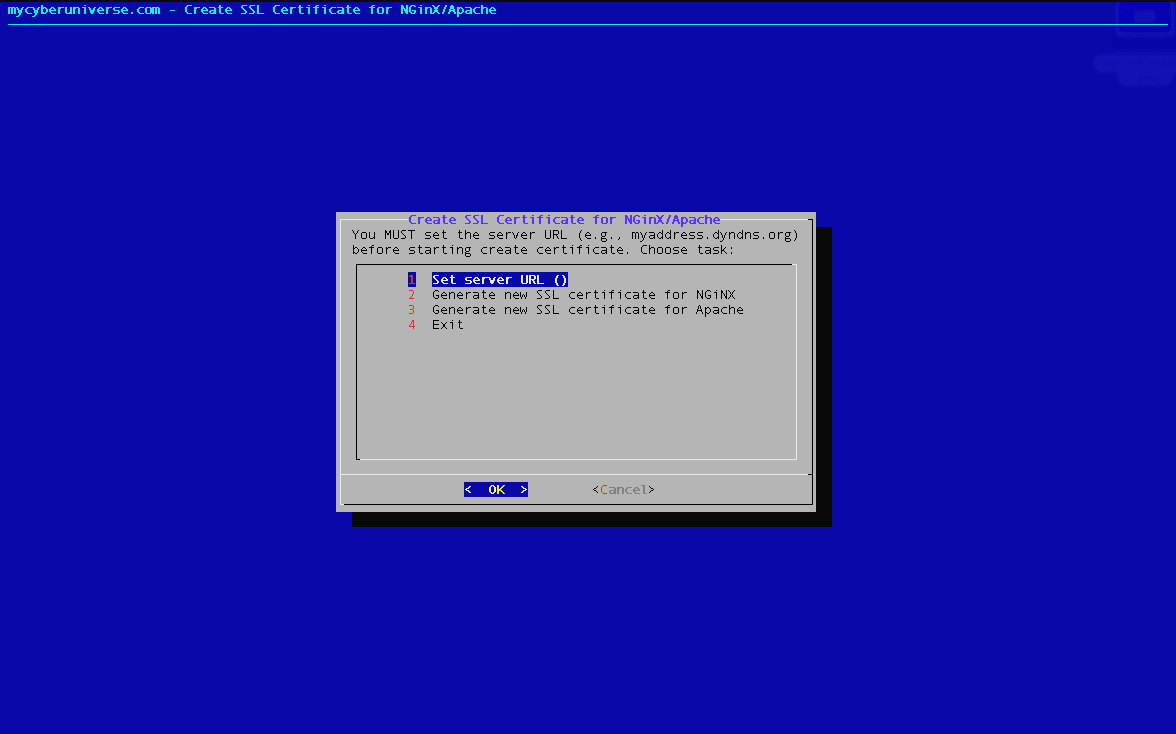SSL сертификат автоматически при помощи BASH сценария

Для быстрого и лёгкого создания самоподписанных SSL сертификатов для вэб-серверов Apache и Nginx Я написал не большой сценарий на «BASH».
SSL сертификаты необходимы для обеспечения безопасной передачи информации в сети. В криптографии и компьютерной безопастности под самоподписанным SSL сертификатом понимают сертификат открытого ключа, изданный и подписанный тем же лицом, которое он идентифицирует. То есть, если вы сами, для своего домена или IP-адреса, создали SSL сертификат то он будет называться самоподписанным. Самоподписанные SSL сертификаты лучше всего подходят для внутреннего пользования (интранет).
- Название: SSL Certificate Creater (ssl_crt_creater.sh)
- Описание: Create a self-signed SSL Certificates for Apache and Nginx web-servers.
- Язык: BASH
#!/bin/bash
#=============================================================#
# Name: SSL Certificate Creater #
# Description: Create a self-signed SSL Certificates #
# for Apache and Nginx web-servers. #
# Version: 1.1 #
# Data: 30.10.2014 #
# Author: Arthur Gareginyan #
# Author URI: https://www.arthurgareginyan.com #
# License: GNU General Public License, version 3 (GPLv3) #
# License URI: http://www.gnu.org/licenses/gpl-3.0.html #
#=============================================================#
# USAGE:
# chmod +x ./ssl_crt_creater.sh
# sudo ./ssl_crt_creater.sh
################## DECLARE FUNCTIONS ######################
checkRoot() {
if [ $(id -u) -ne 0 ]; then
printf "Script must be run as root. Try 'sudo ./ssl_certificate_creater.sh'\n"
exit 1
fi
}
checkNeededPackages() {
lst="dialog openssl"
for items in $lst
do
type -P $items &>/dev/null || {
echo -en "\n Package \"$items\" is not installed!"
echo -en "\n Install now? [yes]/[no]: "
read ops
case $ops in
YES|yes|Y|y) sudo apt-get install $items ;;
*) echo -e "\n Exiting..."
exit 1 ;;
esac
}
done
}
setServerName() {
cmd=(dialog --backtitle "arthurgareginyan.com - Create SSL Certificate for NGinX/Apache" \
--inputbox "\n Please enter the URL of your website." 22 76 $__servername)
choices=$("${cmd[@]}" 2>&1 >/dev/tty)
if [ "$choices" != "" ]; then
__servername=$choices
else
break
fi
}
checkServerName() {
if [ "$__servername" = "" ]; then
setServerName
fi
}
installCertificateNginx() {
dialog --backtitle "arthurgareginyan.com - Create SSL Certificate for NGinX/Apache" \
--title "Create SSL Certificate for NGinX" \
--msgbox "\n We are now going to create a self-signed certificate. While you could simply press ENTER when you are asked for country name etc. or enter whatever you want, it might be beneficial to have the web servers host name in the common name field of the certificate." 20 60
mkdir -p /etc/nginx/ssl
openssl req -new -x509 -days 365 -nodes -out /etc/nginx/ssl/$__servername.crt -keyout /etc/nginx/ssl/$__servername.key
chmod 600 /etc/nginx/ssl/$__servername.key
dialog --backtitle "arthurgareginyan.com - Create SSL Certificate for NGinX/Apache" \
--title "Create SSL Certificate for NGinX" \
--msgbox "\n Done! Your certificates are available at /etc/nginx/ssl/$__servername.crt & /etc/nginx/ssl/$__servername.key" 20 60
}
installCertificateApache() {
dialog --backtitle "arthurgareginyan.com - Create SSL Certificate for NGinX/Apache" \
--title "Create SSL Certificate for Apache" \
--msgbox "\n We are now going to create a self-signed certificate. While you could simply press ENTER when you are asked for country name etc. or enter whatever you want, it might be beneficial to have the web servers host name in the common name field of the certificate." 20 60
clear
mkdir -p /etc/apache2/ssl
openssl req -new -x509 -days 365 -nodes -out /etc/apache2/ssl/$__servername.crt -keyout /etc/apache2/ssl/$__servername.key
chmod 600 /etc/apache2/ssl/$__servername.key
dialog --backtitle "arthurgareginyan.com - Create SSL Certificate for NGinX/Apache" \
--title "Create SSL Certificate for Apache" \
--msgbox "\n Done! Your certificates are available at /etc/apache2/ssl/$__servername.crt & /etc/apache2/ssl/$__servername.key" 20 60
}
######################## GO ###############################
checkRoot
checkNeededPackages
while true; do
cmd=(dialog --backtitle "arthurgareginyan.com - Create SSL Certificate for NGinX/Apache" \
--title "Create SSL Certificate for NGinX/Apache" \
--menu "You MUST set the server URL (e.g., myaddress.dyndns.org) before starting create certificate. Choose task:" 20 60 15)
options=(1 "Set server URL ($__servername)"
2 "Generate new SSL certificate for NGiNX"
3 "Generate new SSL certificate for Apache"
4 "Exit")
choice=$("${cmd[@]}" "${options[@]}" 2>&1 >/dev/tty)
if [ "$choice" != "" ]; then
case $choice in
1) setServerName ;;
2) checkServerName
installCertificateNginx ;;
3) checkServerName
installCertificateApache ;;
4) clear
exit 0 ;;
esac
else
break
fi
done
clear
exit 0
Использование
Перед запуском сценария необходимо установить права на исполнение:
chmod +x ssl_crt_creater.sh
Запуск сценария:
./ssl_crt_creater.sh
После создания SSL сертификата, следует самостоятельно привязать его к серверу.
Скриншот меню сценария:

Описание
Для выполнения сценария требуется наличие пакетов dialog и openssl. Пакет dialog используется для визуализации меню, а при помощи пакета openssl создаётся сертификат. Если они не установлены то сценарий предложит их установить самостоятельно.
В сценарии, для создания сертификата и ключа, используется такая команда для NginX:
openssl req -new -x509 -days 365 -nodes -out /etc/nginx/ssl/$__servername.crt -keyout /etc/nginx/ssl/$__servername.key
и такая для Apache:
openssl req -new -x509 -days 365 -nodes -out /etc/apache2/ssl/$__servername.crt -keyout /etc/apache2/ssl/$__servername.key
Описание аргументов:
req- Запрос на создание нового сертификата.-new- Создание запроса на сертификат (Certificate Signing Request – далее CSR).-x509- Вместо создания CSR (см. опцию -new) создать самоподписанный сертификат.-days 365- Срок действия сертификата 365 дней (1 год).-nodes- Не шифровать закрытый ключ.-out- Место сохранения сертификата.-keyout- Место сохранения закрытого ключа.
После выполнения сценария будет автоматически создан новый сертификат и закрытый RSA ключ длиной 2048 бит. Они будут помещены в рабочую директорию (Apache - /etc/apache2/ssl/, NginX - /etc/nginx/ssl/) и на них будут установлены права 600 для безопасности.
Теперь закрытый ключ и самоподписанный сертификат находятся сдесь:
/etc/apache2/ssl/*.crt и /etc/apache2/ssl/*.key
или здесь:
/etc/nginx/ssl/*.crt и /etc/nginx/ssl/*.key
Arthur is a designer and full stack software engineer. He is the founder of Space X-Chimp and the blog My Cyber Universe. His personal website can be found at arthurgareginyan.com.


